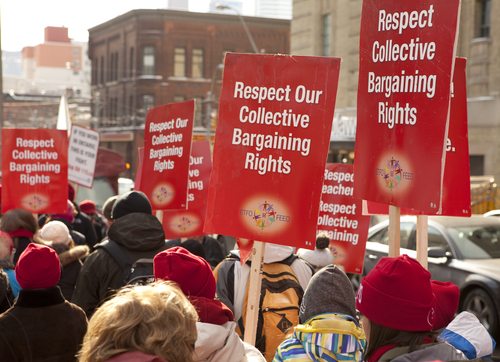
February 6, 2014; Public Sector Inc. (Manhattan Institute)
The conservative side of the political ledger is continuing to produce data suggesting that the American public is losing faith in public sector unions. CUNY political science assistant professor Daniel DiSalvo culled from a number of sources the following statistics:
- In 2009, less than half of polled Americans said that they approved of labor unions
- In 2012, Education Next reported that 22 percent of Americans thought teachers’ unions had a positive effect on schools, though teachers themselves are much more positive about their unions
- In California, 44 percent of participants in a poll said that public sector unions do more harm than good. (DiSalvo suggests that the 16 point swing to the negative over two years may have been attributable to the BART strike.)
In contrast, DiSalvo acknowledges that a USA Today/Gallup poll reported that 61 percent of those polled favored collective bargaining rights for public sector unions, though he hypothesized that perhaps citizens don’t really know what the term “collective bargaining” really means. (He suggested that they might think it is “a nice sounding phrase suggesting that we should all work together.”)
Sign up for our free newsletters
Subscribe to NPQ's newsletters to have our top stories delivered directly to your inbox.
By signing up, you agree to our privacy policy and terms of use, and to receive messages from NPQ and our partners.
There are plenty of other polls on public sector unions for DiSalvo and others to review. A 2011 survey by the New York Times and CBS nearly matched the USA Today/Gallup findings on support for public union collective bargaining, but interestingly reported that only a slight majority of Republicans themselves favored limiting some collective bargaining rights. But there are polling results that don’t go public unions’ way. Politico reported in 2013 that the Clarus Group, hired by the Qorvis public relations group, found that 64 percent of its respondents didn’t believe that government employees should be represented by unions at all—including 49 percent of Democratic respondents. In Detroit, where the pensions of Detroit’s municipal workforce are hanging in the balance of its bankruptcy, a nationwide Reason-Rupe poll (Reason is a conservative journal dedicated to free markets) found that 65 percent of Americans, 53 percent of Democrats, and even 56 percent of public sector workers opposed a federal bailout for the Motor City.
The findings of these and other polls suggest that public sector unions have, at a minimum, a branding challenge. Somehow, the public’s understanding and appreciation of public sector unions’ brand value has fallen short of the message that the unions are trying to convey. Public sector unions aren’t doing much that’s different for their members now than they have before, but with the reelection of Scott Walker as governor of Wisconsin, conservative pundits gleefully declared the beginning of the “doom” of public sector unions. However, a Walker-like effort to limit public sector unions in Ohio failed despite high-profile support from conservative groups.
The image and acceptance of public sector unions are still up in the air; it’s the public union brand, not the substance of what public unions do, which is being really being debated in the ballot box and through public opinion polls. DiSalvo’s conclusion fits with conservative philanthropy’s new targeting of public sector unions: “All told, Americans appear poised to decide whether they believe public sector unions have positive impacts on public policies they care about.”—Rick Cohen













